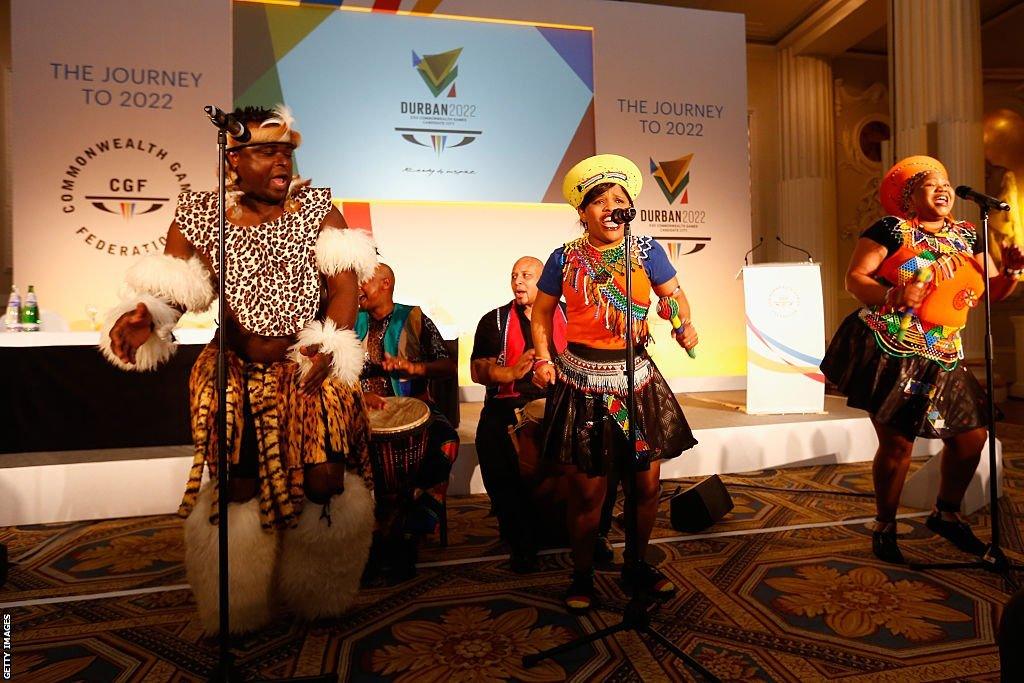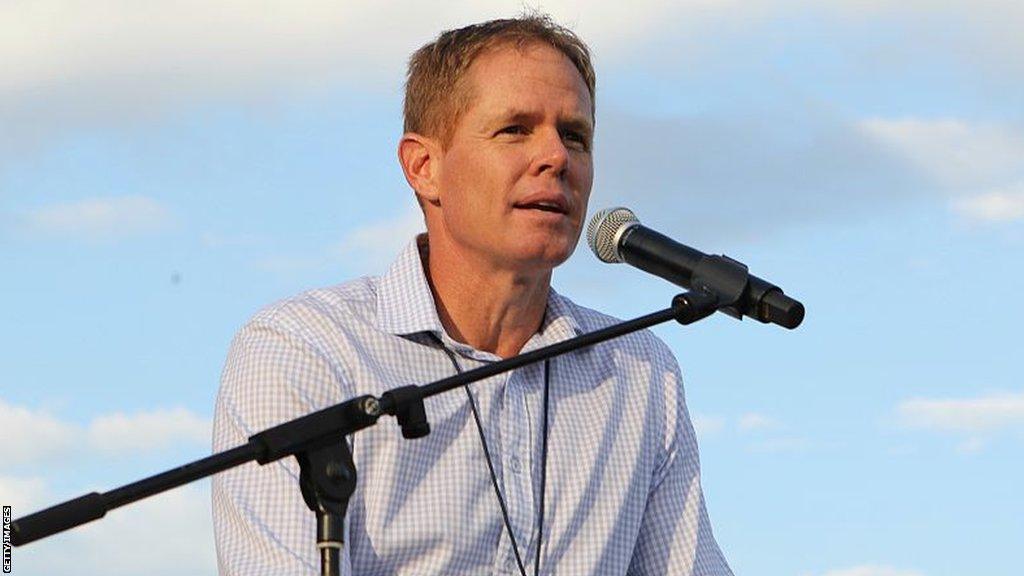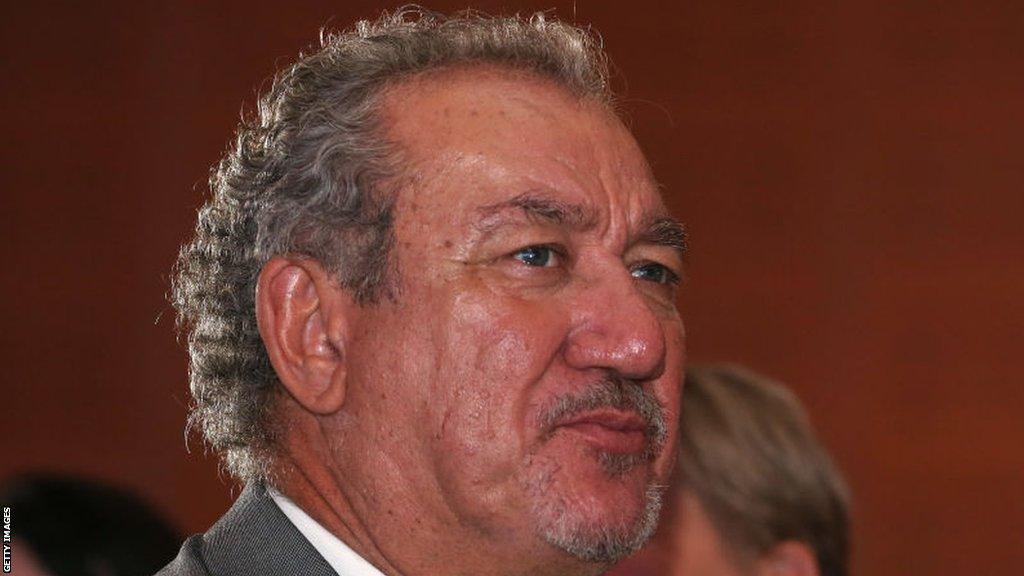Commonwealth Games 2026: African nations 'have the ability' to host future events
- Published

Durban lost its right to host the 2022 Commonwealth Games amid concerns about its financial viability
There were distinct echoes of Durban's aborted hosting of the 2022 Commonwealth Games when the Australian state of Victoria cancelled its plans to put on the 2026 edition.
Financial constraints were partly to blame when the South African coastal city was stripped of hosting rights in 2017, something which organisers in Victoria also said had driven their decision.
With an alternative host yet to be chosen for 2026, the future and relevance of the 93-year-old event has been called into question.
But Africa's ability to one day accommodate the Games, and the will of leaders on the continent to see that happen, remain strong, according to one of the key figures involved in a potential new hosting bid - as long as "baby steps" are taken first.
"Quietly, at the back of our minds, we know we can deliver a world-class Commonwealth Games - so we will be looking into that," Barry Hendricks, the president of South Africa's Sports and Olympic Committee (Sascoc), told BBC Sport Africa.
"There are other countries on the continent that have the ability to do it, especially in North Africa. The Commonwealth Games Federation (CGF) still has hopes that Africa can host a Commonwealth Games."
'There was no value'
Durban's bid suffered from disagreements between the national and provincial governments over who would foot the bill, as well as in-fighting over the composition of the local organising committee.
Many were relieved when hosting rights were removed in favour of the English city of Birmingham, seeing a desperate need for South Africa to address pressing social issues such as housing, health and infrastructure as more important.

South Africa cricket legend Shaun Pollock was among the high-profile names to publicly back Durban's attempt to host the 2022 Commonwealth Games
David Grevemberg, the CGF's chief executive until 2022, said at the time South Africa's government had been unable to fully keep to commitments outlined in its bid, but added the federation remained "committed to the inspiring potential of a Games in the continent".
The CGF struggled to find a 2026 host before Victoria volunteered in April 2022, but state premier Daniel Andrews said a tripling of projected costs - rising to more than $4bn - had made his decision a relatively straightforward one, describing the Games as "all cost and no benefit".
Dr Mike Sutcliffe, who was the city manager of the municipality encompassing Durban between 2002 and 2011, said their evidence showed the Games had "nothing like the pull" of the Olympic Games or the Fifa World Cup, which South Africa hosted in 2010.
"There was no real value-add that was happening to the city except huge cost," added Sutcliffe. "Personally, I don't think hosting the Commonwealth Games is a worthwhile exercise.
"There are many other events that could be a better proposition.
"I don't see what value the Commonwealth Games would bring."
When it comes to back-up hosts for 2026, Sutcliffe is urging potential bidders - including Australia's Gold Coast, whose mayor has voiced interest - to "do their homework."
"If it does fit with what you're trying to achieve in your city, it's not too expensive and you have control over it, then go for it," he said.
"But look at all the other events that you could be bidding for if you have that kind of money to spend."
Putting on a show
There have also been questions around the prestige of the event, with many elite athletes seeing it as a road bump in their preparations for other larger and more prestigious international events, including the Olympic Games.
Hendricks believes the Commonwealth Games still have a key part to play in nurturing and developing international competitors.

Barry Hendricks, the president of South Africa's Sports and Olympic Committee, says leaders are exploring future events to host
"As a pure sports event, it plays a huge role in the stepping-stone process of athlete development and preparation for the Olympics and Paralympics," he suggested.
"It's also a unique environment where we have para athletes and able-bodied athletes performing on the same stage and in the same environment, which gives them a unique opportunity to mix and mingle.
"It's great to have an international event of its calibre, where the athletes can pit themselves against the world's best once more."
The World Economic Forum, external warned in 2022 that South Africa risked state collapse over issues including unsustainable state spending.
Hendricks acknowledged the country is witnessing what he calls a "quite a tumultuous period" but expects his organisation to work with the government, national federations and the CGF on future plans.
The Commonwealth Youth Games and the International School Sport Federation's biennial Gymnasiade are two events South Africa could consider hosting, he said.
"We need to start with baby steps by first hosting smaller multi-sport events before thinking of bigger projects like the Commonwealth Games or the Olympics.
"We've successfully hosted cricket, rugby and soccer World Cups, which are big events, but we're speaking about a multi-coded event with many different types of facilities and technical officials and a lot of different logistical aspects.
"Once we have a stable environment and the environment has fully recovered after Covid, we can then start planning around issues like that.
"Let's try and prime ourselves for the bigger multi-code events by going for the smaller ones first - and then building our confidence and our infrastructure, as well as our capacity."
There may be the desire to see an historic first Commonwealth Games take place on African soil but that dream still feels a long way off.